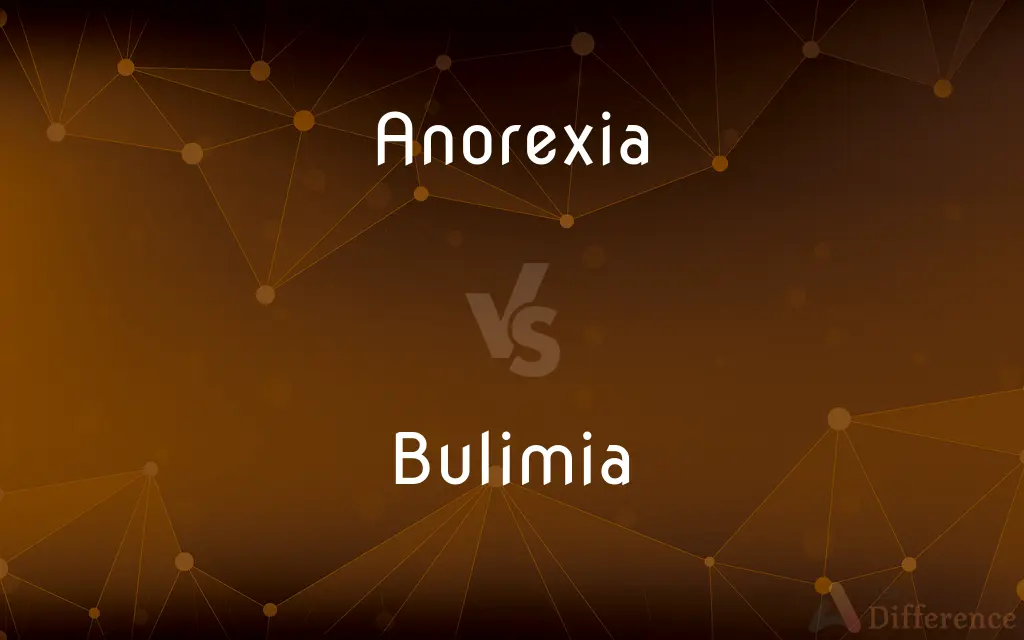Anorexia vs. Bulimia — What's the Difference?
By Tayyaba Rehman — Updated on September 23, 2023
Anorexia involves self-starvation and an intense fear of gaining weight, while bulimia is characterized by binge eating followed by purging to avoid weight gain.

Difference Between Anorexia and Bulimia
Table of Contents
ADVERTISEMENT
Key Differences
Anorexia and bulimia are both eating disorders, but they manifest differently in behavior and symptoms. Anorexia is chiefly characterized by a prolonged refusal to eat and an obsessive fear of gaining weight. Individuals with anorexia often view themselves as overweight, even if they are severely underweight.
Bulimia, on the other hand, involves episodes of excessive eating, known as binges, followed by behaviors to avoid weight gain, like vomiting or excessive exercise. Bulimic individuals often feel a lack of control during these binges, consuming food even if they aren't hungry. After bingeing, the overwhelming feeling of guilt or shame drives the purging behaviors.
Anorexia tends to result in significant weight loss, with individuals often having a skeletal appearance. The emphasis is on calorie restriction, fasting, or excessive exercise. Bulimia might not always result in noticeable weight loss because of the cyclical nature of bingeing and purging. The weight of individuals with bulimia can range from underweight to overweight.
Both disorders come with severe physical and psychological complications. Anorexia can lead to malnourishment, heart problems, and organ failure due to prolonged self-starvation. Bulimia can result in electrolyte imbalance, gastrointestinal problems, and dental issues from regular vomiting. It's essential to understand that while the behaviors differ, both anorexia and bulimia stem from a distorted body image and an intense fear of gaining weight.
Comparison Chart
Behavior
Prolonged refusal to eat
Binge eating followed by purging
ADVERTISEMENT
Self-perception
Often sees oneself as overweight even if underweight
Feels a lack of control during binges
Physical appearance
Significant weight loss, often looks skeletal
Weight can range from underweight to overweight
Complications
Malnourishment, heart problems, organ failure
Electrolyte imbalance, gastrointestinal problems
Primary focus
Calorie restriction, fasting, excessive exercise
Consuming large amounts of food, then purging
Compare with Definitions
Anorexia
A severe eating disorder marked by self-starvation.
Due to anorexia, she struggled with extreme weight loss.
Bulimia
An eating disorder involving binge eating followed by purging.
Bulimia led her to consume excessive amounts of food, only to vomit afterward.
Anorexia
Often results in malnourishment and physical complications.
The prolonged effects of anorexia weakened her heart.
Bulimia
Individuals often feel a lack of control during binges.
Despite not being hungry, bulimia drove him to continue eating.
Anorexia
Accompanied by a distorted body image.
Despite being underweight, her anorexia made her see otherwise.
Bulimia
Characterized by feelings of guilt or shame after bingeing.
After a binge, his bulimia caused overwhelming remorse.
Anorexia
May involve excessive exercise as a means to burn calories.
Anorexia drove him to workout relentlessly, fearing any weight gain.
Bulimia
Can result in physical complications from regular purging.
Due to her bulimia, she faced dental issues from frequent vomiting.
Anorexia
Characterized by an obsessive fear of gaining weight.
His anorexia was fueled by a distorted self-image.
Bulimia
Weight can fluctuate and range from underweight to overweight.
Though she had bulimia, her weight was within a normal range due to the cycle of bingeing and purging.
Anorexia
Loss of appetite, especially as a result of disease.
Bulimia
An eating disorder characterized by episodic binge eating followed by feelings of shame, depression, and self-condemnation. It occurs chiefly in young women of normal and near-normal weight and is often associated with measures taken to prevent weight gain, such as self-induced vomiting, fasting, or using laxatives. Also called bulimarexia, bulimia nervosa.
Anorexia
Anorexia nervosa.
Bulimia
Excessive or insatiable appetite.
Anorexia
Loss of appetite, especially as a result of disease.
Bulimia
(pathology) A chronic eating disorder characterized by a binge-and-purge cycle - extreme overeating followed by self-induced vomiting.
Anorexia
Anorexia nervosa.
Bulimia
A disease in which there is a perpetual and insatiable appetite for food; a diseased and voracious appetite.
Anorexia
Want of appetite, without a loathing of food.
Bulimia
A disordered eating habit characterized by occasional episodes of excessive eating, followed by self-induced vomiting or abuse of laxatives, to avoid gaining weight; it is often accompanied by feelings of guilt; - called also bulimia nervosa and binge-purge syndrome. It is observed mainly in young women of normal weight.
Anorexia
A prolonged disorder of eating due to loss of appetite
Bulimia
A disorder of eating seen among young women who go on eating binges and then feel guilt and depression and self-condemnation
Bulimia
Pathologically insatiable hunger (especially when caused by brain lesions)
Common Curiosities
Can someone with bulimia be of average weight?
Yes, individuals with bulimia can range from underweight to overweight due to the binge-purge cycle.
Is distorted body image a component of both conditions?
Yes, both anorexia and bulimia are often driven by a distorted perception of one's body and weight.
What is anorexia?
Anorexia is an eating disorder characterized by self-starvation and a fear of gaining weight.
Can anorexia result in heart problems?
Yes, prolonged self-starvation from anorexia can weaken the heart and lead to complications.
Do people with anorexia always look skeletal?
Many with anorexia have significant weight loss, but the severity can vary from person to person.
Can bulimia affect one's teeth?
Yes, frequent vomiting from bulimia can erode tooth enamel, leading to dental issues.
Is guilt a common emotion in bulimia?
Yes, individuals with bulimia often feel intense guilt or shame after bingeing, driving the need to purge.
Are physical complications common in both disorders?
Yes, anorexia can lead to malnourishment and organ failure, while bulimia can cause dental and gastrointestinal issues.
Can you recover from these eating disorders?
Yes, with proper treatment and support, recovery from both anorexia and bulimia is possible.
Are there psychological aspects to these disorders?
Absolutely, both anorexia and bulimia often have psychological roots tied to self-esteem, control, and body image.
How does bulimia differ from anorexia?
Bulimia involves binge eating followed by purging to prevent weight gain, while anorexia focuses on self-starvation.
How is bingeing in bulimia characterized?
Bingeing in bulimia involves consuming excessive amounts of food, often with a feeling of lack of control.
Is exercise a component of these disorders?
Yes, while exercise is healthy, excessive exercise is common in anorexia as a means to burn calories.
Are these disorders more common in any particular demographic?
Eating disorders can affect anyone, but they are more commonly diagnosed in young women. However, men and individuals from all backgrounds can also suffer.
Is anorexia solely about not eating?
While food restriction is central, anorexia also involves fears about weight, body image issues, and can include excessive exercise.
Share Your Discovery

Previous Comparison
Pig vs. Shoat
Next Comparison
Trick vs. TrickeryAuthor Spotlight
Written by
Tayyaba RehmanTayyaba Rehman is a distinguished writer, currently serving as a primary contributor to askdifference.com. As a researcher in semantics and etymology, Tayyaba's passion for the complexity of languages and their distinctions has found a perfect home on the platform. Tayyaba delves into the intricacies of language, distinguishing between commonly confused words and phrases, thereby providing clarity for readers worldwide.
















































